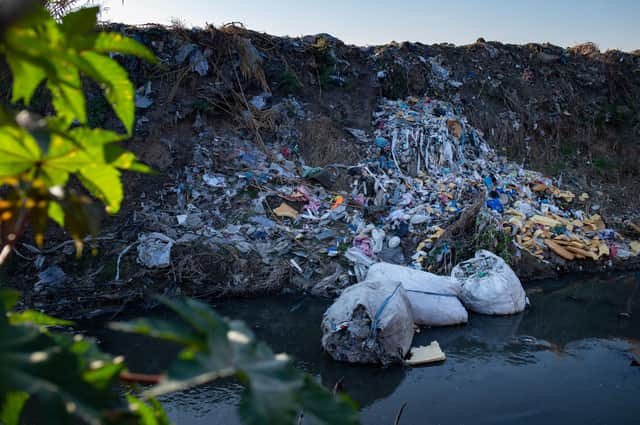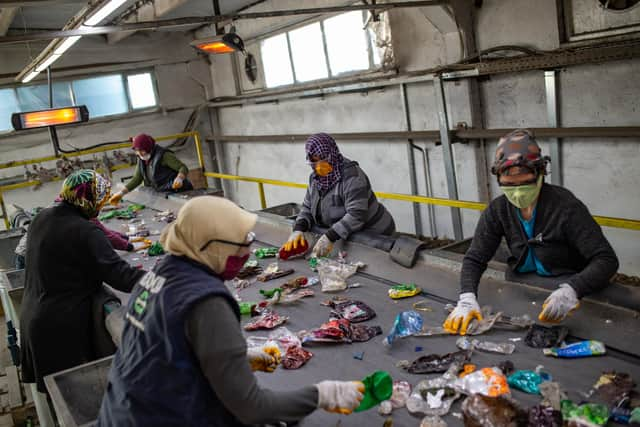Plastic pollution: How consumer activism can save the world from scourge of convenience culture's waste – Christine Jardine MP


Not the big visits into town with my Mum, aunt and Gran. But the weekend morning scamper round the corner to the dairy for rolls, and a pint of milk while Dad picked up the papers.
Occasionally there were eggs to buy too, or a treat and all of it came in what we would now call recyclable packaging. In those days, we just called them a paper bag, a milk bottle and an egg box.
Advertisement
Hide AdAdvertisement
Hide AdI doubt if any of that was ever exported to be burned in the way that we saw hundreds of thousands of tonnes being destroyed this week in Turkey. A massive funeral pyre of plastic, spewing toxic fumes into the atmosphere.
And ironically it came from a misguided attempt to avoid the damage that we all know would have been done to our marine wildlife if that same packaging had been dumped in the sea.
Plastic. A product that was originally, and with not the slightest hint of irony, seen as a vital component of the convenience culture is, we are surely only too painfully aware, now threatening our existence.
It is strangling and choking our co-habitants of the planet and clogging up our rivers and seas.


The idea that it was supposed to be recycled is, I know, the defence of those responsible for the export of the UK waste whose incineration was exposed this week. But recycling plastic is not the only, or even best answer.
Because the moment that reminded me of those childhood dairy trips offered a ready, and yes convenient, alternative.
There is a new shop in Corstorphine, close to where I live, where I can take glass jars from home to refill with pasta, grains, pulse vegetables and more.
Alternatively I can collect what I want in paper bags.
Even the shampoo is in soap-like bars encased in cardboard and you can fill your own containers with cleaning products. Glass, paper and proper shopping bags are on sale to carry it home in.
Advertisement
Hide AdAdvertisement
Hide AdAnd it is not the only example. I recently saw an advert for a dairy that will deliver my milk to the door in bottles and take away the empties to clean and re-use.
My grandmother would have been content with all of that. So am I.
But this is not some Damascene, Greta Thunberg or Extinction Rebellion-inspired conversion. Neither is it age-induced nostalgia for a rose-tinted childhood.
Instead it is frustration at how easy it could be for each of us to play our part in reversing the damage that we have done over decades and the inability of so many to see it.
While governments can make sweeping changes with energy legislation and international agreements it will, at the end of the day, be consumer demand which will force change.
If the UK were to halt the extraction of fossil fuels from the North Sea tomorrow there would still be demand for petrol, domestic heating and industrial production which would necessitate importing fossil fuels from the Gulf or the Americas.
We have to get to the point where there is no demand for petrol or diesel because we have all bought cars which run on alternative fuels. Where there is no need for gas to run our central heating boilers because all our homes have thermal heating pumps, solar panels or individual wind turbines supplying our needs. And where safe, clean hydrogen or some other alternative is the energy which fires our commercial plants.
But first we have to stop looking on it as a purely political decision. Elections should not be a contest to see who is the ‘greenest’ political party, but simply a debate about which one has the best approach to facilitate that change.
Advertisement
Hide AdAdvertisement
Hide AdIn recent years, it has become clear that is precisely what the public expect from us. Demand has created a change in politics.
At the United Nations’ Cop26 climate summit in Glasgow this autumn, governments from across the planet will have the opportunity to lay out how they will push forward the international agenda for change.
But every day between now and then and beyond, we each have the opportunity to create the widespread demand which will pull commercial interests along the same path.
Companies will respond when they see the opportunities to expand that change will bring or the threat to their profits if they don’t.
There are hopeful signs. Not just the new outlets emerging but the established giants like Marks and Spencer who are experimenting with in-store refilling stations of their own, and drinks companies turning away from those infuriating loop contraptions to link cans together.
Petrol companies too have acknowledged the writing on the wall with the first all-electric, fast recharging stations.
I have several outfits in my wardrobe which have been fashioned from material created from recyclables. And every manner of upcycled, restored or repaired furniture has become the norm.
In the 20th century we saw huge advances like overcoming apartheid, establishing gay rights and in winning votes for women emerging from popular movements.
The same is happening with tackling climate change.
Advertisement
Hide AdAdvertisement
Hide AdI was surprised at how satisfying it felt to walk home from the shops laden down with my shopping bag full of paper parcels and reusable containers.
I remembered those long-ago shopping trips and felt more than a pang of regret that so much time had been lost in the pursuit of convenience products that turned out to be nothing of the sort for the planet.
At least now I know that there are options. Weekend mornings can again be a stroll to the shops for perhaps a paper bag of rolls, a glass bottle of milk and a box of biscuits.
All of which containers I can supply myself.
Christine Jardine is the Scottish Liberal Democrat MP for Edinburgh West
A message from the Editor:
Thank you for reading this article. We're more reliant on your support than ever as the shift in consumer habits brought about by coronavirus impacts our advertisers.
If you haven't already, please consider supporting our trusted, fact-checked journalism by taking out a digital subscription.
Comments
Want to join the conversation? Please or to comment on this article.
